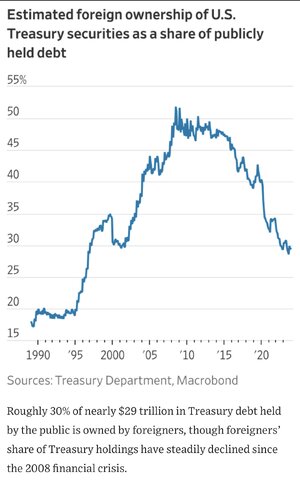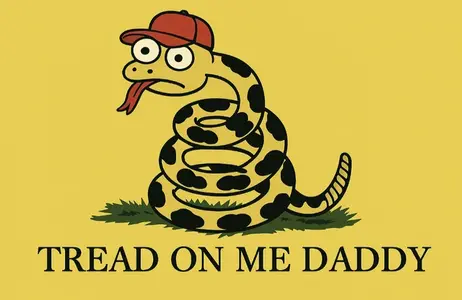- Messages
- 8,127
There is enough information available to declare him incompetent and remove him from office. I know JD is a piece of shit, but anything is better than trump.
Follow along with the video below to see how to install our site as a web app on your home screen.
Note: This feature may not be available in some browsers.
There is enough information available to declare him incompetent and remove him from office. I know JD is a piece of shit, but anything is better than trump.
JD Vance? Be careful what you wish for.There is enough information available to declare him incompetent and remove him from office. I know JD is a piece of shit, but anything is better than trump.
Unfortunately, what other choice do we have right now?JD Vance? Be careful what you wish for.
Could corporate America have been any less impressive? No comments about something being bad for the country, just each executive looking for a carve out for their company.
Well then, dumbass, why not focus on those issues and not take the shotgun mob boss approach, fucking up the economy and alienating our trade partners in the process?

So, I should move to cash before lord trump ends the US economy. Since the only way he knows to deal with people smarter than him that don't kneel is to fire them.Trumpty Dumpty woke up pissed with the markets down big again and his approval ratings, especially on the economy, also tanking.
He DEMANDS that Jerome Powell lower rates. Trump claims if he doesn't the economy will slow down. No terrible businessman with no clue of economics. Your shotgun waffling approach tariff policy is about to bring massive inflation which is slowing down spending. He calls Powell a "loser."
Powell is the mastermind that threaded the needle with rates, got inflation under control, and somehow did it without tanking economy. Brilliance.
Analysts say that if Trump fires Powell, the next market drop will make existing drop look like a tiny blip.
There's a damn good reason we haven't heard from a single Pub in months now, except for Silence who is clearly a Russian troll. I think Pandemic may have chimed in once, and Ramrouser has commented on a couple of non-economic issues. But I have a VERY strong feeling callatoroy and HeelYeah are realizing what catastrophic mistakes they made by supporting this shitshow. Maybe the next time we see them, they'll be willing to own up to it like so many of us have done before.Now markets are down double what they were earlier right after Trump's Twit.
Pandemic stopped by to say it's ok to call people illegal as we are all illegal, which makes us better.There's a damn good reason we haven't heard from a single Pub in months now, except for Silence who is clearly a Russian troll. I think Pandemic may have chimed in once, and Ramrouser has commented on a couple of non-economic issues. But I have a VERY strong feeling callatoroy and HeelYeah are realizing what catastrophic mistakes they made by supporting this shitshow. Maybe the next time we see them, they'll be willing to own up to it like so many of us have done before.

I fell like I could do a better job and I know Jack shit about economics/stock market etc.The Japanese have just been in Washington. Their experience apparently was they went to talk to the American leadership on this matter, and the American leadership said 'what are you offering?' And the Japanese said 'well, what is it that you want?' And the Americans could not explain what they wanted.'

Japan keeps asking the US what it wants in trade talks and can't get an answer | investingLive
Japanese negotiators went home on Fridaywww.forexlive.com
It’s like the old meme:
1. Start a trade war.
2. ???
3. Profit
Turns out it’s a bit harder in real life.
Shipping alfalfa grown in the high desert overseas is a complicated means of sending scarce water overseas.In the Harquahala Valley, hay fields stretch as far as the eye can see.
'It could break us': Valley farmer says Chinese tariffs have crushed the alfalfa export market
Alfalfa hay is mainly used as feed for cattle and is big business in Arizona, with Arizona farms exporting over $100 million of alfalfa overseas a year.www.abc15.com
Alfalfa hay is mainly used as feed for cattle and is big business in Arizona, with Arizona farms exporting over $100 million of alfalfa overseas a year.
Shannon Schulz has been farming in the Harquahala Valley for decades.
"There's no better way to raise a family than on the farm," Schulz said.
Schulz is unique in the Valley, as he not only harvests his alfalfa but also is part of the export process overseas. His main customers are countries in the Middle East, and China.
“Usually, this warehouse is full of hay. It’s not right now because business is just slow," Schulz said.
Business is slow because Chinese dairy farms have all but stopped buying U.S. alfalfa to feed their cattle after the country imposed retaliatory tariffs on U.S. exports. China makes up about half of Arizona's alfalfa export market.
“With the current tariffs in place, which is in total about 66% from China to us, it puts our product out of the marketplace," Schulz said.
Schulz says that now Chinese farms are buying from other countries in Africa and Europe. For the alfalfa now growing in Arizona’s fields, by the time it's ready to be harvested, there may not be a customer to buy it.
Losing about half of his business overnight has not been easy.
“It could break us," Schulz said. "It could break a lot of farmers.”
Schulz says he voted for President Donald Trump and believes in the goals of his tariff plan, to bring manufacturing back to the U.S. and expand exporter access to foreign markets.
“In the long run I think it will be a good thing," He said.
Also

